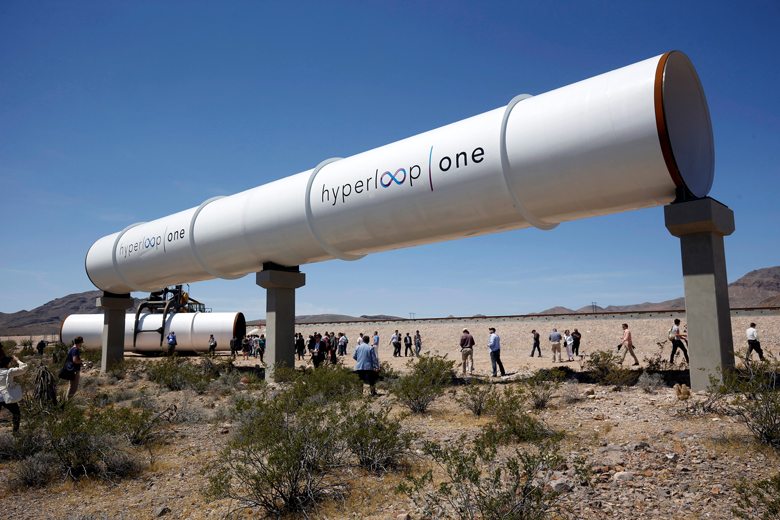

Dubai-based ports operator DP World and US-based Virgin Hyperloop One expect to begin construction on the first section of a commercial Hyperloop-based system capable of transporting passengers and cargo between cities in the first quarter of 2019.
The first 15 kilometre-section of the 150km Hyperloop system linking Pune and Mumbai in India is expected to become operational between 2024 and 2025, by which time both firms expect to obtain all required regulatory approvals and certifications for the ultra-fast transport system.
MEED understands both firms are in final negotiations with investors to finance the project.
“We have not encountered a major issue in terms of securing investors,” a Virgin Hyperloop One spokesperson tells MEED.
The route will become the first segment of DP World’s Cargospeed, a planned global Hyperloop network connecting the various ports operated by DP World as well as airports around the world and catering to high priority and on-demand cargo.
In India, DP World operates the Port of Nhava Sheva, the largest maritime hub in the vicinity of Mumbai. DP World is also the largest investor in Virgin Hyperloop One, which is chaired by UK billionaire Richard Branson.
Branson and DP World group CEO Sultan Ahmed bin Sulayem were on hand to announce the Cargospeed service in Dubai on 29 April.
Cargospeed is a much larger scheme compared to DP World’s initial plan to build a Hyperloop-based system that would move cargo from docked ships to an inland terminal in Jebel Ali Port.
Also expected to become part of the Cargospeed network is the Hyperloop system planned by the Dubai Roads & Transport Authority (RTA). This could connect Dubai’s downtown area to the southern part of the emirate, and possibly to the new Al-Maktoum International airport.
Feasibility studies for both schemes were completed last year, and MEED understands construction work on the Dubai Hyperloop test route could begin within two to three years.
According to Bin Sulayem, Hyperloop-based cargo transport systems have the potential to eliminate intermediaries in the logistics sector including ports and carriers by allowing the service provider to ship products directly to consumers at speeds comparable to an airline jet.
“Such systems can potentially move cargo point to point … in no more than 48 hours anywhere in the world,” Bin Sulayem said.
The executive said the new transport system will eliminate a lot of inefficiencies in the logistics supply chain, and could save logistics firms “hundreds of billions of dollars over time by reducing document processing, inventory and warehousing costs”.
Branson highlighted the economic and social benefits of the planned transport system.
“Ports sit on valuable land … a hyperloop cargo transport system can free up that land by allowing cargo to be transported directly from docked ships to their destination that could be 20km inland,” said Branson, adding that lorries carrying cargo no longer have to go through city streets.
According to Branson, the plan to have the same hyperloop system carrying both passengers and cargo promises high economic returns as it can be built at about half the cost of two separate rail systems, in addition to offering flight speeds.
Bin Sulayem said Hyperloop and other new innovations promise to transform the entire logistics sector. With the right systems in place, cargo can be loaded every six seconds onto a Hyperloop pod from a docked ship directly to consumers,” he said.
“This will make global trade significantly more efficient.”
Hyperloop infrastructure includes a station or loading platform, a capsule or pod that carries passengers or cargo, and a tube through which the capsule will travel, which utilises electro-magnetic propulsion and passive magnetic levitation systems.
The technology could theoretically deliver cargo transport speeds of up to 1,000km per hour.
READ MORE: DP World extends Sokhna port package bids deadline
| This article has been unlocked to allow non-subscribers to sample MEED’s content for FREE. MEED provides exclusive news, data and analysis about the Middle East every day. Subscribe to MEED to have full access to Middle East business intelligence. Click here |
You might also like...

Iraq signs deal to develop the Akkas gas field
25 April 2024

Emaar appoints beachfront project contractor
25 April 2024

Acwa Power signs $356m Barka extension
25 April 2024

AD Ports secures Angola port concession agreement
25 April 2024
A MEED Subscription...
Subscribe or upgrade your current MEED.com package to support your strategic planning with the MENA region’s best source of business information. Proceed to our online shop below to find out more about the features in each package.






